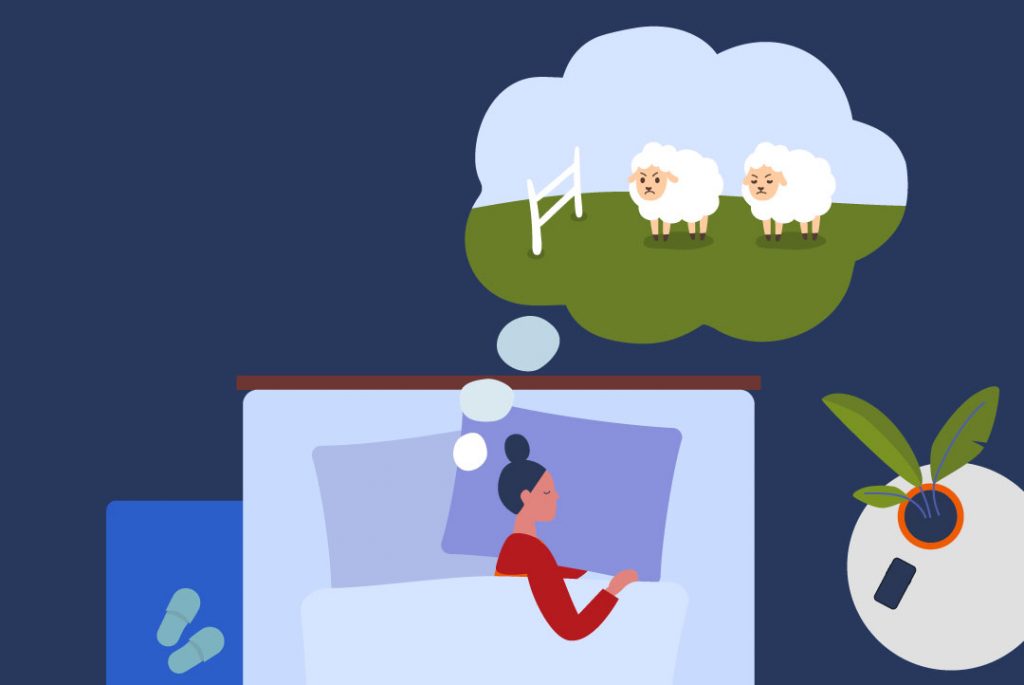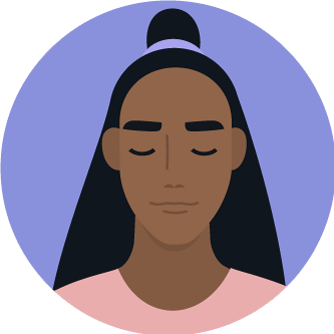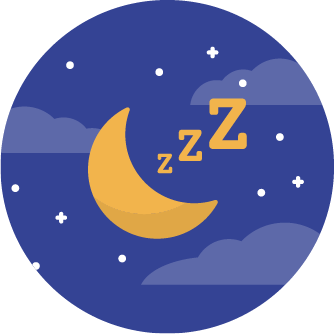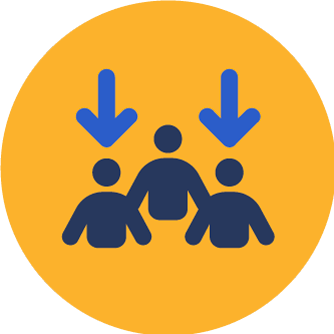TAKE ACTION
AUGUST 2022
Is stress keeping you awake at night?
Stress affects our emotional, physical and behavioral health. The right amount of stress can be a positive force that helps us do our best and stay alert and energetic. But too much can make us tense and anxious — and that can cause sleep problems.
Looking for more? Find other articles below

What are the signs of stress?
Sleep problems are a sign of stress. Other common signs include depression, tension, anxiety, work mistakes and poor concentration. You may also experience physical symptoms like headaches, upset stomach, fatigue, appetite loss, and chest, neck or back pain. If your stress goes on unchecked, your health and sense of well-being can suffer — especially if you’re not getting enough rest.
Learn to manage stress
Take a good look at your physical condition and your daily activities so you can identify your stressors. Do you have pain? Do you feel overwhelmed with life’s demands? Once you identify your stressors, you can take steps to reduce them. Consider these tips for reducing stress and getting a better night’s sleep:

Seek social support.
Spending time with family and friends is an important buffer against stress. It can be helpful to share your problems with people who care for you.

Practice thought management.
You can learn to change thought patterns that produce stress. Thoughts to watch out for include those concerning how things should be and those that focus on negative generalizations. For example, “I’m a failure because I can’t afford to go on a long vacation this year.” Your Costco benefits, such as AbleTo, offer virtual therapy that can help you learn to change negative thought patterns into healthier ones.

Exercise.
Physical activity can help you blow off steam, which reduces stress. In addition, flexible, loose muscles are less likely to become tight and painful in response to stress. That’s because when you exercise, your body releases chemicals called endorphins that can reduce your perception of pain. Endorphins also trigger a positive feeling in the body. But it’s best to exercise at least two hours before bedtime so your body temperature returns to normal. If you have a medical condition or are over age 50, it’s best to check with your doctor before beginning an exercise regimen.

Learn to relax.
Practice yoga, meditation or deep breathing, which can all help you relax. Try taking a warm bath and turning off electronics to help you wind down before you go to bed.

Eat a healthy diet.
Junk food and refined sugars low in nutritional value and high in calories can leave you feeling out of energy and sluggish. A healthy diet, low in sugar, caffeine and alcohol can enhance your well-being and reduce stress. So think about grabbing a salad for lunch, rather than a slice of pizza.

Get enough sleep.
A good night’s sleep enables you to tackle the day’s stress more easily. When you’re tired, you’re less patient and more easily agitated, which can increase stress. Most adults need seven to nine hours of sleep each night. Practicing good sleep methods along with lowering your stress can help improve your quality of sleep.

Delegate responsibility.
Often, having too many responsibilities can lead to stress. Free up time and decrease stress by delegating responsibilities to others — whether that means having your kids do their own laundry, or asking for help when you need it.
These tips and suggestions can help many people sleep soundly through the night. However, if you have frequent sleep problems, talk to your doctor. They can check you for possible medical problems, such as an overactive thyroid or sleep disorders, or a psychiatric condition, such as an anxiety disorder, and recommend treatment.
You can also turn to Resources For Living® (RFL®)*. You’ll find self-care resources for sleep disorders, including tools for related health issues like anxiety, depression, stress, addiction, chronic pain, and overall well-being.
*Resources For Living is available to all employees and members of their household, including children up to age 26 living away from home.
Source: WebMD. Tips to reduce stress and sleep better.
If you’d like to improve your sleep by learning ways to manage your stress better, the following resources can help.
Resources for you
- AbleTo helps you and your family members who are enrolled in the Aetna medical plan take charge of your emotional health. From one-on-one teletherapy to digital activities, this free virtual program offers support for managing stress and helping improve sleep. Text COSTCO to 87177** to download the app and get started. You can also visit AbleTo or call 833-881-1444.
- Resources For Living® (RFL®) includes tools for dealing with anxiety, depression and other emotional problems that can affect sleep. It also includes Talkspace, which offers therapy for teens, age 13+. Or you and members of your household can access six no-cost counseling sessions with in-person, televideo and chat options. Visit RFL or call 833-721-2320 (TTY: 711) to learn more.
- **Message and data rates may apply.
- Resources For Living® (RFL®)* includes tools for dealing with anxiety, depression and other emotional problems that can affect sleep. It also includes Talkspace, which offers therapy for teens, age 13+. Or you and members of your household can access six no-cost counseling sessions with in-person, televideo and chat options. Visit RFL or call 833-721-2320 (TTY: 711) to learn more.
- Need help finding an in-network provider like a PCP, behavioral therapist, psychologist or psychiatrist to help you reduce stress and improve your sleep? Visit Costcobenefits.com and click “Find a Provider” under What If I. You can also call Triple-S at 800-981-3241.
- AbleTo helps you and your family members who are enrolled in the HMSA medical plan take charge of your emotional health. From one-on-one teletherapy to digital activities, this free virtual program offers support for managing stress and helping improve sleep. Text COSTCO to 87177** to download the app and get started. You can also visit AbleTo or call 833-881-1444.
- Resources For Living® (RFL®) includes tools for dealing with anxiety, depression and other emotional problems that can affect sleep. It also includes Talkspace, which offers therapy for teens, age 13+. Or you and members of your household can access six no-cost counseling sessions with in-person, televideo and chat options. Visit RFL or call 833-721-2320 (TTY: 711) to learn more.
- **Message and data rates may apply.

